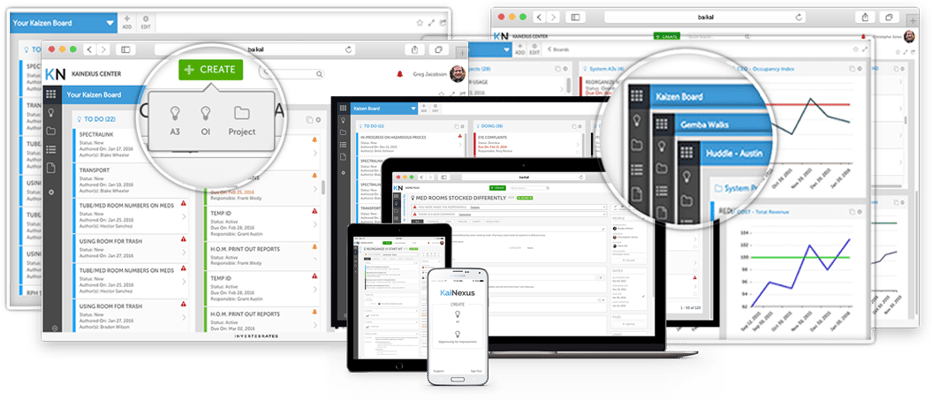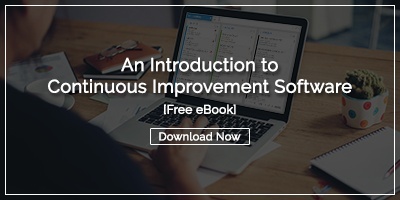 We are fortunate to have the opportunity to talk to many people interested in implementing a software solution to help them amplify their continuous improvement efforts. Most of the time, they have never looked for such technology before, and they are not exactly sure how to get the rest of the organization on board with the approach. To help you overcome the most common challenges, we've put together this guide with tips on how to justify, evaluate, and implement a solution.
We are fortunate to have the opportunity to talk to many people interested in implementing a software solution to help them amplify their continuous improvement efforts. Most of the time, they have never looked for such technology before, and they are not exactly sure how to get the rest of the organization on board with the approach. To help you overcome the most common challenges, we've put together this guide with tips on how to justify, evaluate, and implement a solution.
Get the Budget: Share the Benefits of Improvement Software
There are quite a few ways that structured improvement technology can result in a positive ROI. Here are the most essential:
Collect More Opportunities for Improvement
Our clients have found that employees have fantastic ideas about how to improve process operations and eliminate waste. But too often, they stay silent because there is not an easy way to report them. Improvement software solves this by providing everyone with a common platform to document each opportunity. It also boosts engagement by letting people know that someone will evaluate each idea and that many employee suggestions will get implemented.
Complete More Projects
Collecting ideas for improvement is the first step, but the rubber meets the road when you begin implementing them. Without a structure, improvement projects are often placed on the back burner as day-to-day emergencies get more attention. With improvement management software in place, you can overcome this common problem. The solution keeps improvement work visible and helps managers stay on top of the progress of each project.
Sustain engagement Over the Long-Term
Frequently, continuous improvement is introduced with great fanfare, but enthusiasm wanes over the subsequent months. Improvement technology can help. By calculating and reporting on the impact of improvement work and activity and engagement, people start to take the results of continuous improvement personally. Measurable metrics keep everyone from the C-level to the front-line informed and active.
Enhance Collaboration
Often, the most significant opportunities for improvement are found at the intersections of various functions. An improvement platform helps create a common language and socialize standard tools for making progress happen. This improves cross-functional collaboration and enables you to solve the most challenging problems.
Grow a Repository of Knowledge
Improvement software becomes your team's vault of knowledge. Everyone gains access to the lessons learned and artifacts created from every other project. Before your team starts a new project, they can look at similar work and build on what's already been done. The organization as a whole gets smarter every time a project is completed.
Evaluate: The Essential Features of Improvement Software
Opportunity Collection
Every employee should be able to log in and document each opportunity for improvement at any time from anywhere. The solution should also support attachments of images and documents to help communicate the idea.
Automated Workflow
Once an idea for improvement is captured, it should automatically be routed to the manager or supervisor who will consider it for implementation. If the idea is selected for execution, leaders should be able to assign tasks and assemble teams.
Alerts and Notifications
To help keep projects from stalling out, the solution should have alerts and notifications that let people know when tasks are assigned, due dates or missed, and new ideas are ready for evaluation.
Impact Reports
As we mentioned before, measuring the impact of improvement work is essential for both justifying the investment in software and sustaining engagement over time. Look for a solution with qualitative and quantitative measures and reports that visualize KPIs like cost reduction, safety improvements, customer satisfaction, and employee activity.
Visual Management Dashboards:
Visualizing information brings it to life and helps leaders quickly access improvement culture's health. The dashboards should be configurable so that each person gets the information that is most meaningful to them.

Implement: Get the Most out of Your Solution
Think Big
Outstanding ideas can come from anyone in the organization, so when you implement improvement software, involve as many people as possible. The best solutions have flexible roles and access configurations to give each person the access and capabilities they need.
Train Effectively
Training is crucial if the concept of continuous improvement is new to your organization. People need to understand its principles as well as how to use the software solution. The software should be easy to use, but training is still essential when introduced and as part of the new employee onboarding process.
Celebrate Wins:
Your team will be motivated to work harder on improvement initiatives when they see measurable results. Especially in the beginning, use the solution's impact metrics and success broadcasting capabilities to make sure everyone gets the details of each win, no matter how small.
Practice Accountability
One additional advantage of improvement management software is that it helps managers hold people accountable for positive change. Using engagement, activity, and impact as part of each employee's performance evaluation reinforces the organization's commitment to continuous improvement.
Rolling out improvement software is a big step, but it is an essential one on the road to better business results. There will be bumps, but if you pick a partner with a solution that meets the qualifications above and follow these implementation best practices, you'll reach your goals and enjoy the journey along the way.

![[WEBINAR] Strategy Deployment Software Demo](https://no-cache.hubspot.com/cta/default/326641/67b72769-975a-48b1-b5d8-4ba0fe1f3b76.png)


Add a Comment